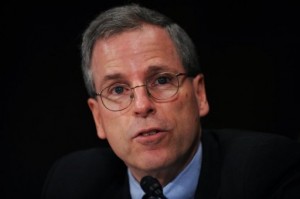 The U.S. ambassador to Syria told Congress Wednesday that there is no evidence yet that either the Syrian government or opposition forces used chemical weapons in attacks this week.
The U.S. ambassador to Syria told Congress Wednesday that there is no evidence yet that either the Syrian government or opposition forces used chemical weapons in attacks this week.
“We are looking very carefully at the reports,” Ambassador Robert Ford told the House Foreign Relations Committee. But, he said, “so far, we have no evidence which substantiates the reports.”
Both sides have called for an investigation. The Syrian Opposition Coalition said Wednesday it wants a “full international inquiry” into what it has alleged was government use of chemical weapons near the city of Aleppo.
At the United Nations, Syria’s representative asked Secretary General Ban Ki-moon to send a technical team to Syria to conduct an investigation into the government’s claim that the rebels used chemical weapons.
The attack killed at least two dozen people. If confirmed as a chemical weapons attack, it would mark the first use of chemical arms and a major escalation in Syria’s two-year-old conflict. The United States has warned Syrian President Bashar al-Assad that a chemical attack would be a “red line” that would trigger a U.S. military response, but it is also is expressing deep skepticism about the reports of such an attack Tuesday.
There was no independent confirmation that either Assad’s government or the rebels had used chemical weapons.
On Tuesday, Syrian Information Minister Omran al-Zoubi said rebels fired “a rocket containing poison gases” at the town of Khan al-Assal, southwest of Aleppo, from a part of the city they control. The state-run Syrian Arab News Agency (SANA) said 25 people were killed and 86 injured in the attack. Rebels, in turn, accused forces loyal to Assad of firing a Scud missile containing deadly chemicals.
The Britain-based Syrian Observatory for Human Rights said 26 people died in the attack, including 16 soldiers. But the observatory’s director, who uses the pseudonym Rami Abdulrahman, said he could only “confirm that there was a rocket attack but not that any chemicals were used.”
In Washington, White House spokesman Jay Carney said the allegations were being studied. State Department spokeswoman Victoria Nuland characterized the Syrian claim as an attempt to discredit the opposition and said the United States has no evidence that rebels have chemical weapons capabilities.
A senior State Department official, speaking on the condition of anonymity because the reports were preliminary, said U.S. officials think the Syrian government has retained control over its chemical weapons supplies.
Rep. Mike Rogers (R-Mich.), chairman of the House Intelligence Committee, told CNN’s Wolf Blitzer that there is a “high probability” that Syria has used chemical weapons in the war, but that final verification is needed.
Photos posted online by SANA showed alleged victims in hospital beds flanked by medical staff in surgical masks. State television featured an interview with an elderly man wearing a face mask and a white bandage on his forehead. “They fired a missile, and it exploded with something like a powder,” the man said.
In the same TV report, a doctor said the patients appeared to have been exposed to “phosphorus material or poisonous material,” which he said had led to “heavy vomiting and difficulty in breathing, almost appearing like extreme suffocation cases.”
Reuters news agency reported that one of its photographers visited victims in Aleppo hospitals who were suffering breathing problems and that people said they could smell chlorine after the attack.
The possibility of a chemical attack was closely scrutinized in neighboring Israel, where the media cited security officials as saying that the reports, though unconfirmed, seemed credible.
“The fact they apparently used chemical weapons against civilians needs to worry us and shows the urgency of taking care of the issue,” Yuval Steinitz, the newly appointed minister of intelligence and strategic affairs, told Israel Army Radio. He declined to comment on which side in the conflict might have used the weapons.
Israeli Prime Minister Benjamin Netanyahu warned Monday that Israel would act to prevent chemical weapons from falling into the hands of militants, such as the Iranian-backed Hezbollah group in Lebanon.
The chief of Israeli military intelligence, Maj. Gen. Aviv Kochavi, told a policy conference near Tel Aviv last week that Assad is readying chemical weapons for use, though no orders had been given to deploy them. He, like U.S. officials, said Syria’s weapons stockpiles remained under government control.
Russia, an ally of the Assad government, echoed the government’s claim on Tuesday that Syrian rebels had used a chemical weapon, an act that Moscow called alarming and dangerous.
In a statement, opposition activists from Khan al-Assal said the Syrian military had tried to target rebel positions with a missile but had hit a regime-controlled area instead.
“This was a land-to-land rocket, which the opposition does not have. They do not have poison gases either,” said an activist who goes by the alias Majid Abdullah.
Opposition figures noted that the government has not previously reported that rebels have seized any chemical weapons.
The attack came hours after the Syrian opposition elected Ghassan Hitto, 50, a Syrian American information-technology executive, as the prime minister of an interim government that would administer areas of Syria held by rebel forces.The election, at an opposition conference in Istanbul late Monday, could lead to closer links between the political opposition outside the country and the fighters and local officials governing rebel-held territory inside Syria.
Washington Post

Leave a Reply
You must be logged in to post a comment.